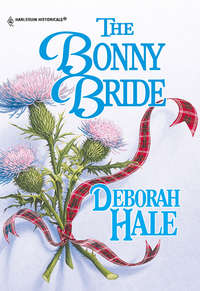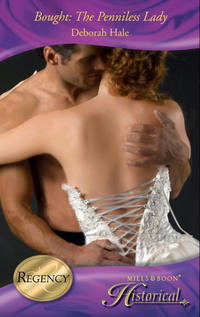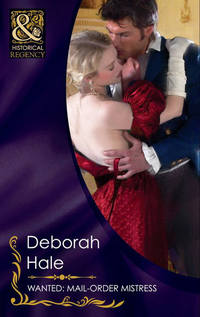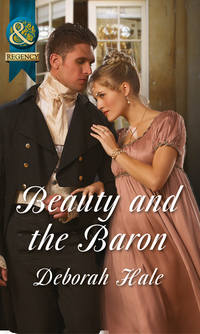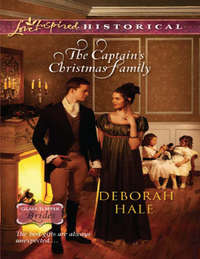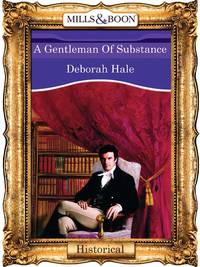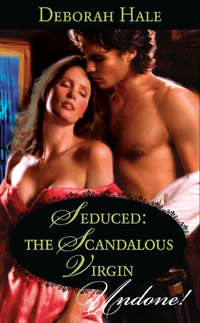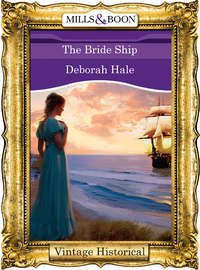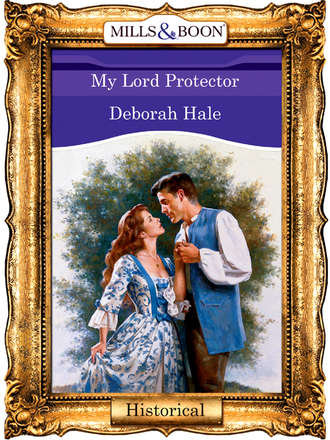
Полная версия
My Lord Protector
“Have someone bring these packages to my sitting room, and ask Mrs. Davies if she can spare me a cup of chocolate.” Julianna pulled off her gloves. “Pray don’t glower so during this merry season, Mr. Brock. I am certain it will. have a detrimental effect on your digestion.”
Flouncing away from the sputtering steward, she met Sir Edmund descending the staircase. Immediately regretting her impudence, she ducked her head in shame, steeling herself for his rebuke. Much to her surprise, he passed without a word. When Julianna glanced up, his face looked grave and impassive as ever, but she detected an unmistakable twinkle in his gray eyes.
Chapter Four
“Milady!” squealed Gwenyth, “a new cap for me? What a treat!”
Holding up the daintily laced creation for inspection, Julianna passed it to her maid with a flourish and a warm smile.
“Yes, Gwenyth, you must be sure to wear it on your visit. I understand it is the latest style. It would not surprise me in the least if you received several marriage proposals, thanks to this cunning bit of millinery. So, you must promise not to desert me—unless your beau is quite irresistible! Take along these nuts and sweetmeats for your Christmas feast. Eat plenty, sleep late and enjoy yourself completely. I will expect an entertaining report of the festivities upon your return.”
Gwenyth’s attention strayed momentarily from contemplation of the exquisite little cap. Her brow puckered. “Are you sure you’ll be all right without me, ma‘am? ’Tis all very well, two men on their own for several days, but a lady needs her maid. Who will help you dress and bathe and do your hair?”
“Never fear. I am quite capable of drawing my own bath and pinning up my own hair. As for dressing—if I encounter a hook or lace that I cannot reach, what else is a husband for?”
The thought of Sir Edmund stooping to the incongruous role of tiring woman sent both maid and mistress into an irrepressible fit of laughter. Impulsively, Julianna took Gwenyth’s hand. “I shall miss your company and high spirits more than all the services you do me. I wish you the merriest of Christmasses.”
Two ponderous knocks at the sitting room door announced the presence of Mr. Brock. “Gwenyth, your aunt is looking for you. I believe your ride has arrived.”
Holding her new cap and other Christmas bounty behind her skirt, Gwenyth withdrew. Once the steward had turned his back on her, she flashed Julianna a broad grin and a wink.
“I will also be taking my leave within the hour,” Brock informed Julianna. “Do you require anything in the meantime?”
He presented such a grim aspect, she could not resist a gentle jape. “I only require, Mr. Brock, that you endeavor to enjoy your holiday. I promise to refrain from mischief in your absence—so far as in me lies.”
The teasing did not sit well with Brock, who stalked off, wearing a look that told Julianna he would love to upend her over his knee and whip her like a naughty child. In reply, she abandoned decorum, thrusting out her tongue at his retreating back.
Spying through the frosted pane of her window some time later, Julianna confirmed Brock’s departure, along with the last of the other servants. Momentarily overcome by the giddy freedom of a prisoner set at liberty, she let out a loud whoop and danced a clumsy pirouette across the sitting room before collapsing upon the chaise in a heap of helpless mirth.
When her laughter subsided, Julianna began to consider what to do with herself for the next two-and-a-half days. She thought of looking for Sir Edmund, but decided his reluctant company held little appeal. Then another idea seized her. What better opportunity to explore Fitzhugh House? Tossing a wrap around her shoulders, she set off.
She passed a pleasant hour lingering in the dim galleries, viewing Sir Edmund’s collection of paintings—an eclectic mixture of landscapes, portraits and still-life studies.
Gradually, Julianna noticed how quiet and empty the house had become without the muted comings and goings of the servants. Her footsteps on the parquet floor reverberated down the wide, shadowy corridor, and she felt a sudden shiver of nameless unease. Pulling open the first door that came to hand, she happened upon Sir Edmund’s suite. As he was not there to find her prying, she decided to indulge her curiosity with a furtive look around.
Though Sir Edmund’s apartment lacked a separate sitting room, his bedchamber looked much larger than her own. An enormous, old-fashioned bed occupied a considerable space. Tall and boxlike, with plain posts of dark wood and hangings of a somber olive hue, it was practically a room unto itself. Besides a chaise and armchair, the only other furnishings were a battered sea chest and an open-shelved cabinet that housed a collection of exotic-looking statuary and lacquerwork, together with a set of brass navigational tools. Framed maps and charts adorned the walls. It gave Julianna the distinct impression of standing in a captain’s cabin on some great ship. She could have sworn she smelled a faint tangy odor of the sea. A spartanly masculine domain, Sir Edmund’s apartment did not invite her to linger.
On her way back to her own rooms, Julianna suddenly inhaled a familiar scent. Even before she realized it was Crispin’s favorite pomade, her heart gave a happy lurch of recognition. Following the smell, she discovered his chamber. She had known, in an abstract fashion, that she was living in Crispin’s home. Yet it had never felt that way, until now. The bedchamber appeared tidy and impersonal, but the cluttered little dressing room looked as if its tenant had just stepped out and might return at any moment.
A brush held strands of Crispin’s chestnut curls among its bristles. The wardrobe bulged with coats that Julianna knew like old friends. Taking out a well-cut dark blue velvet, she drew it around herself. Eyes closed, she nuzzled her cheek against the soft nap of the lapel, inhaling the essence of Crispin that clung to the fabric. At that moment, Julianna returned to the gardens at Vauxhall, and the fragrant summer afternoon when Crispin Bayard had proposed to her.
In early June, the gardens were awash in a palette of pastel flowers, on a backdrop of dewy green foliage. Attended by the gallant captain, Julianna savored her first taste of the amusements offered there. They hummed along with popular airs, performed by a string consort. They viewed statuary and displays of Mr. Hogarth’s engravings. They nibbled from a bowl of strawberries in the refreshment pavilion. By far Julianna’s favorite diversion was wandering the verdant footpaths on the captain’s arm, absorbed in polite flirtation. Finding a secluded bench, they paused to rest. Her escort grew unwontedly quiet
“Have I tired out your voice as well as your legs, Captain?” she asked in jest, only to be taken aback by the grave, pensive set of his handsome features. “Or is something wrong?”
“Miss Ramsay...Julianna...” Upon his lips, her name sounded the most lyrical word in the language. “It is wrong of me to speak, but neither can I keep silent. With the hazardous undertaking before me, it could not be a worse time for romantic distractions...most unfair to any lady... advancing a compact of so long duration, with no assurance of my safe return...”
“Captain Bayard...Crispin...” His name sparkled on her tongue like champagne. “I believe I have kept you too long in the sun. You are not making a particle of sense.”
“No wonder. Since the day we met, I have taken leave of my senses. Sense tells me it is madness to meet with you so often, when I may not tender an honorable proposal. However, the light of your beauty and the music of your voice are too sweet a madness to resist.”
Languidly drawing off her glove, Julianna reached out to push that unruly curl back from his brow, as she had longed to do since their first meeting. Her hand strayed down his cheek. Crispin needed no further invitation to kiss her. Their lips made a delicious confection of berries and cream.
“Crispin, are you asking for my hand?” Julianna asked breathlessly, when he drew back.
“Could you consider it? Two years without you stretches ahead like a lifetime. Could you wait two years for me, and look to wed upon my return?”
Smiling pertly, she replied, “You have tasted my answer.”
His anxious expression eased into a smile of barely containable happiness. “Ah, but I grow forgetful as well as mad,” he teased. “Give me your answer again, that I may remember.”
Laughing with delight, she obliged. Then, as Crispin held her, she rested her cheek against the soft velvet of his coat.
When Julianna opened her eyes, she saw that Crispin’s dressing room had grown dark in the early winter twilight. She had no wish to roam the eerily echoing galleries of Fitzhugh House in this deep gloom. With a reluctant sigh, she slipped the coat from her shoulders and returned it to the wardrobe. Pausing at the door, she blew a kiss back into the empty room.
In the darkened corridor, Julianna soon became disoriented. After one or two unsuccessful attempts, she confidently pulled open her own door.
Edmund set aside his razor and bolted a swallow of brandy. Dutch courage, he thought, grimacing at his half-shaved face in the looking glass. Nonsense, another part of him countered, just a drop of oil to lubricate my tongue. Raising a skeptical eyebrow, he slid the blade of his razor from ear to chin in a single deft sweep. Not that he’d need to do much talking if that goose of a girl didn’t soon put in an appearance. Where could she have gone? He’d noticed nothing missing during a quick inspection of her rooms. So she couldn’t have run away—more the pity.
Four quick strokes shaved the stiff whiskers from Edmund’s upper lip. Dashedly inconsiderate of the girl, bolting to who-knew-where, after all the trouble he’d taken to secure them a stage-side box at Drury Lane tonight. Odd she’d go missing now. Ever since she’d blackmailed him into letting her stay for Christmas, she had looked in far brighter spirits. It had been everything he could do to keep a sober face when he’d overheard the little chit saucing Mordecai Brock. Thinking back on it, Edmund grinned to himself and tipped another draft of his brandy. About time Brock had somebody to put him in his place.
Tilting his head back, Edmund held the razor poised above his neck. He started at the sound of someone barging into his bedchamber. “Who’s there!” he barked—a wonder he hadn’t slit his throat from ear to ear!
“It is I, Sir Edmund,” came an apologetic squeak. “I lost my way in the galleries and opened your door by mistake. Please excuse the intrusion.”
Before he could reply, Edmund heard the door close again. With a growl of vexation, he dropped the razor and splashed a palmful of water on his face. Tugging on a coat and grabbing a candle, he set off after Julianna.
“No need to run away,” he said, puffing as he caught up with her. “I didn’t mean to snap your head off, but the noise startled me. Even as I called out, I realized it must be you. Ghosts seldom haunt new houses.”
She glanced over at him with a nervous smile, probably wondering if he meant to flay her alive over an honest mistake. Had he given her reason to think him such an ogre? With a spasm of chagrin, Edmund acknowledged the possibility.
“Besides...” He made an effort to allay her fears. “I have been looking for you. I reserved us a box at Drury Lane for this evening. The company is staging a revival of Mr. Congreve’s The Way of the World. It is an excellent piece, very amusing.”
“I have read the text of the play,” Julianna replied eagerly. “I would love to see it performed. This will be my first time at the theater. Papa always protested I was too young. He had finally promised to take me...” Her voice trailed off.
Fearing she might start blubbering, Edmund hurried on, determinedly cheerful. “Then I must keep his promise.”
They reached Julianna’s rooms, where Edmund immediately set to work banking the coals of her sitting room fire.
“You must dress quickly... and warmly,” he called over his shoulder. “They put small braziers in the boxes on cold nights, but it can take a while to heat up.”
Having completed his fire-tending chores, Edmund replaced the screen. He sat on the chaise for a few minutes, twiddling his thumbs. “Have you eaten yet?” he shouted in to Julianna, but received no reply. “I thought we might take a late supper at one of the eating houses around Covent Garden. If you get hungry in the meantime, we can always buy some oranges at the theater.”
Edmund sat for a few minutes more. Then he got up and wound Julianna’s mantel clock, admiring the Flemish craftsmanship. He sat down again, drumming an impatient tattoo with his fingers on the arm of the chaise. Though he had managed to forget many aspects of his first marriage, he still vividly recalled how long it had taken Amelia to dress for any outing. Despite lengthy preparations, the result had never satisfied her.
“Sir Edmund...”
He spun about to see Julianna standing in her bedroom door, the half-secured back of her snuff-brown frock presented to him.
“May I impose upon you to finish hooking my gown?” She gave a deprecatory laugh at her own plight “I’m unequal to the contortions required to reach the two between my shoulder blades.”
“This will be a new job for me,” Edmund quipped, “but I believe I can manage.” He set to the task, resolutely trying to ignore the tantalizing distraction of wispy red-gold curls clustered at the nape of Julianna’s neck.
When, for an instant, his fingertips brushed the warm silk of her skin, he was overwhelmed by disquieting memories of the kiss she had offered him on their wedding night—memories he had ruthlessly suppressed for weeks.
“There, how is that?” He quickly stepped back. “I think I have all the hooks matched with their eyes. Throw on a cloak, girl, and let us go before we miss the first act.”
Julianna fairly danced at his side as they walked down to the foyer of Fitzhugh House and climbed into the waiting carriage. She kept up a voluble chatter about the plays she had read and would like to see performed. Edmund relaxed, sensing that he need not contribute much to the conversation. He couldn’t help approving of the girl’s taste in reading matter and her cogently expressed opinions.
As they took their seats in a prominent front box, Edmund felt many eyes upon them. On the nearest faces he read mingled respect and envy. How curious that no displays of his wealth had ever occasioned such covetous looks as his squiring of a beautiful young woman. Edmund scowled, trying to mask the ridiculous rush of elation that surged within him as the play commenced.
It concerned family intrigue—a battle for control over the estate of Lady Wishfort. Through the evening, Edmund found his glance often straying sidelong, to catch Julianna’s reaction to a particular jest or bit of stage business. She sat indecorously hunched forward, elbows resting on the lip of the box. Her chin cupped in one hand, his young wife appeared blind and deaf to anything but Congreve’s brilliant comedy.
Every nuance of the action played across Julianna’s luminous, mobile features. No one in the theater that evening laughed so readily and merrily at the subtlest quip. No one clapped with such appreciative glee when a favorite character gained the upper hand. No one joined so enthusiastically in the ovation when the actors took their bows. Edmund found his own laughter and applause flowing with less than usual restraint. Never could he remember enjoying an evening of theater so keenly. Julianna’s spontaneous delight was as contagious as it was refreshing.
The air had turned milder and damp when Edmund steered Julianna through the stream of exiting theatergoers. They made their way to supper on foot, through the light Christmas fog. A group of waits, the Yuletide street musicians employed by London’s aldermen, was performing carols near the busy intersection of Catherine and Russell Streets. As Edmund and Julianna approached, the waits concluded a lively rendition of “I Saw Three Ships.”
“My father’s favorite carol,” Julianna mused aloud.
In the diffuse glow of the streetlamp, Edmund looked down into her rosy girlish face. He saw a wistful luster in her wide doe eyes. Why, she was little more than a child, he realized, an orphaned child living on the charity of a virtual stranger. Who could blame her if she pined, or wept, or craved the poor comfort of his company? Edmund felt his craggy features warmed by a kindly, almost paternal smile.
‘“Three Ships’ is my favorite carol, as well,” he said, “like many an old sailor.” With that, he fished in his waistcoat pocket for a few coins to offer the waits.
Carriages clattered to and fro on the cobbles of busy Bow Street as they crossed. On a side street near Covent Garden, they entered a building whose signboard ostentatiously proclaimed it Eldridge’s Select Supper Club. Engrossed in the play, Julianna had not given food a second thought Now, as a host of succulent aromas assailed her nose, she found herself heartily famished. The warmth of the dining alcove made a pleasant change from the drafty theater box. A glass of port warmed her further, whetting her already sharp appetite to a keen pitch.
Fortunately, the food soon arrived. It was abundant and delicious: clear soup, rabbit smothered in onions, accompanied by herb dumplings, braised celery and carrots. Julianna groaned when offered her favorite Banbury cakes. If only she could have loosened the stays of her corset to relieve the pressure on her stomach! Throughout the meal, Sir Edmund ate little, as was his wont, but imbibed of his wine more liberally than usual. Perhaps for that reason he proved a surprisingly agreeable conversationalist. Julianna found their usual tongue-tied formality eased.
“Do I take it, from your rapt attention this evening, that you enjoyed the play?” he asked.
“It was everything I could have hoped,” Julianna sighed.
“Fitzhugh, old fellow!” A voice rang out. “Thought it must be you. Spotted you from clear the other side of the playhouse. Thought you might come back here for a bite. Haven’t seen you about the town in months. Had to indulge me curiosity and seek out the identity of your lovely young companion. Miss.”
The man executed an exaggerated bow in Julianna’s direction—a perilous feat for one so diminutive in height and almost perfectly spherical in shape. An ill-fitting peruke perched precariously upon the top of his head, and a roguish patch covered one eye.
Sir Edmund responded guardedly. “No, I have not been about in the evenings of late. This is my wife.” He hesitated over that last word, then smiled apologetically at Julianna. “My dear, may I present Langston Carew, Esquire. Carew, Lady Julianna Fitzhugh. Her father was the late Mr. Alistair Ramsay.”
“A pleasure, ma’am.” The little fellow beamed. “Knew your father slightly. Well, Fitzhugh, forgoing the bachelor’s life at this late date, what? Wise man! If I could find a pretty little baggage like this to warm me old bones on a winter’s night, I’d never step from me own hearth! Haw, haw!”
Sir Edmund cringed visibly. Julianna wondered if he expected her to take offense. In fact, every aspect of this comical old gallant proclaimed such honest admiration and irrepressible good humor, she felt drawn to Langston Carew. In reply to his ribald comments, she lavished upon him her most radiant smile.
Less amused, Sir Edmund fixed his mouth in an upturned grimace. His tone conveyed a forced pretense of cordiality. “Perhaps you should think of marrying, Carew. Never too late, they say.”
“Ahem. Yes, I suppose. Well, I’ll not keep you from your dinners. A merry Christmas, Sir Edmund and Lady Fitzhugh. Perhaps we’ll see more of you about the town this winter!”
Sir Edmund nodded dismissively. “Aye, Carew, perhaps.”
When Carew had retired out of earshot, Sir Edmund addressed Julianna on the quiet. “A vulgar old devil, but not bad at heart. He was the assistant factor at Madras when I was there.”
The information intrigued her. “You must tell me more of your adventures in the Indies, Sir Edmund.”
“Yes,” he replied, without offering to go on.
Just as they ascended the stairs, the tall pedestal clock in the entry hall of Fitzhugh House struck one. Sir Edmund escorted Julianna to her rooms. Once again he attended to her fire, and checked the level of coal in the scuttle. Then he turned from the hearth, rubbing a smudge of soot from his fingertips.
“Mr. Handel is giving a private presentation of his latest oratorio tomorrow evening at Haymarket. I have heard good reports of the work since it was performed in Dublin. The concert will raise funds for the Foundling Hospital. As a patron, I should attend. Would you care to accompany me?”
“Yes, please, Sir Edmund.” Julianna clapped her hands eagerly. “I so admire Mr. Handel’s music!”
“Now, now,” he cautioned, “do not expect too much. This is not a public premiere, more of a formal rehearsal.”
“I am sure I shall not be disappointed. Good night, Sir Edmund. Thank you for the play and the supper. I cannot recall when I have enjoyed myself more.”
At her door, Sir Edmund turned and posed an unexpected question. “You miss your father very much, Julianna?”
Perhaps because his query caught her off her guard, she answered with simple sincerity. “I do—especially at this time of year. We were very close.”
“I envy you.” She could scarcely hear his reply. Perhaps he had not intended it for her ears at all.
Before she could reply or question, he was gone.
Hurriedly Julianna undressed and burrowed, shivering, under the bedclothes. Bright scenes from the play danced through her mind. She smiled to herself in the darkness, anticipating tomorrow’s concert. Drifting toward sleep, she found her thoughts turning again and again to the enigma of Sir Edmund. Yawning, she shook her head in private perplexity. He could be such pleasant company one minute, then turn stonily reticent the next. For Crispin’s sake, she wanted to make a friend of his uncle. And for Sir Edmund’s sake as well. Beneath his show of cool self-sufficiency, she sensed a core of deep loneliness.
Chapter Five
The next morning, Julianna lingered in bed as long as she dared, dreading exposure to the chilly air. There were distinct disadvantages, she decided, to giving all one’s servants a holiday. She had become spoiled—used to rising in a warm room with hot water to wash and a steaming cup of tea to drink. Driven by hunger, Julianna finally took a deep breath and bolted from her bed. Hurriedly, she dressed in her warmest gown. Entering her sitting room, she found the fire already burning. On her breakfast table sat a plate of buttered bread and a pot of tea, still hot She could only smile to herself and shake her head, no closer to solving the riddle of Sir Edmund Fitzhugh.
Again that evening, Julianna considered wearing her new green silk gown. In the end, she decided it might be too bright and fashionable for an evening of sacred music. Instead, she settled on a frock of genteel gray. Its color gave her complexion a sallow cast, while the cut made her look no more than twelve years old. Julianna comforted herself with the thought that she was going to watch and listen, and not to display herself. She was beginning to regret her impulsive purchase of the stunning emerald gown she could never find an occasion to wear.
Any worries over her costume vanished with the opening bars of the oratorio. Though it was ostensibly a rehearsal, the musicians were doubtless aware of their highly critical audience and determined to perform well. London music lovers had turned out at the Opera House in force, curious for a taste of the work Dublin had received so well.
Julianna had never heard so many instruments and voices massed. In her estimation, the resulting music beggared description. The soloists’ fine voices soared above the lush orchestration in melodies so evocative and hauntingly familiar she longed to sing with them. During the great “Hallelujah,” the very air throbbed with exultant music. Lost in the moment, she reached for Sir Edmund’s hand, clasping it tightly. As the piece ended, she stirred from her trance and pulled her fingers away, her cheeks burning.


